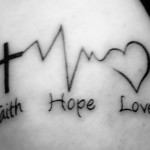 The following post is by Jason Bilbrey, our Director of Pastoral Care here at The Marin Foundation. You can read more from Jason at his blog, www.jasonbilbrey.com.
The following post is by Jason Bilbrey, our Director of Pastoral Care here at The Marin Foundation. You can read more from Jason at his blog, www.jasonbilbrey.com.
We did communion a few weeks ago at church. I joined my friends in a slow, quiet shuffle toward my pastors holding out the sacraments at the front of the community center gymnasium where we gather for services. In decades past, I would use this time to hype up reverent thoughts about Jesus’ gruesome death. The torn flesh. The whiplashes. The nails. Mental images to make me feel penitent. “For anyone who eats and drinks without recognizing the body of the Lord,” as my pastor growing up would routinely caution us, “eats and drinks judgment on himself.” Translation: ingest at your own risk. There were many Sundays I chose to mitigate the risk and just stay in my seat.
But not anymore. These days I often stand in line waiting to partake in the Lord’s Supper with the same nonchalance that I stand in front of my microwave, waiting for my burrito to cook.
I’m less concerned about the cleanliness of my conscience than about the cleanliness of my fellow church members’ hands. But there’s Purell for that. It sits in a giant dispenser on a stool in the front, like a third element. (“This is 63% ethyl alcohol hand sanitizer, purchased for you. Take this in remembrance of the worshippers in line behind you.”)
Have I regressed in my attitude toward this sacred church ritual? I don’t think so. But I certainly haven’t progressed. Growing up, I thought communion was a private moment between me and Jesus, one in which his act of sacrifice on our behalf, graphically symbolized by the eating of his body and drinking of his blood, lead me to feel totally unworthy to participate. Today, I believe I am worthy, precisely because of Christ’s sacrifice on our behalf. My understanding of the Gospel has changed. But the exercise is still largely a private moment between me and God, in my mind.
A friend of a friend recently reminded me why I’m wrong to think that way. She was at her father’s funeral service and denied communion because she was a lesbian. As if the grief of losing her father wasn’t enough, she suddenly had to face a blatant and ugly act of discrimination because of her sexual orientation. She had just sat back down in the pew, totally stunned, when the man next to her pulled out a piece of cinnamon candy from his coat pocket. “This is the body of Christ,” he said, holding it out to her, “broken for you.”
I haven’t been able to shake that story since I first heard it.
Communion is deeply and inextricably communal. It’s about fellowship, participation and equality.
Just look at it’s history. The Lord’s Supper used to be an actual supper. Not a baguette and Welch’s. A full blown meal. When the Apostle Paul writes his first letter to the church in Corinth, he reprimands them for how they handle communion:
“When you come together, it is not the Lord’s Supper you eat, for when you are eating, some of you go ahead with your own private suppers. As a result, one person remains hungry and another gets drunk. Don’t you have homes to eat and drink in? Or do you despise the church of God by humiliating those who have nothing?” (1 Cor. 11:20-22, NIV).
Some are gorging themselves on the sacraments, while others go hungry. There is a basic inequality here that is totally antithetical to the Gospel. The Good News that Jesus preached is that all are welcome at the table, and that the head of the table is reserved for the least* deserving of the group. The Corinthians had it all wrong.
It is within this context that Paul issues the warning that plagued my Sunday mornings growing up:
“So then, whoever eats the bread or drinks the cup of the Lord in an unworthy manner will be guilty of sinning against the body and blood of the Lord. Everyone ought to examine themselves before they eat of the bread and drink from the cup. For those who eat and drink without discerning the body of Christ eat and drink judgment on themselves.” (1 Cor. 11:27-29).
What’s fascinating to me today is how interchangeable the body of Christ (the one that was whipped, crippled and hung at calvary) is with the Body of Christ (his church, the one where we are his hands and feet, where one member in no important than the other). It seems like a deliberate play on words. The great symbol of communion is not the metaphor in food form. It’s God’s children gathering around the table to share a meal. Christ seems to be most present not in the bread and the wine, but in the coming together hungry and leaving together satisfied.
God has so aligned himself with us that his body becomes our body. The blurring of lines between his physical needs and our own is matched by the blurring of who’s included and who’s excluded from fellowship:
“For I was hungry and you gave me something to eat, I was thirsty and you gave me something to drink, I was a stranger and you invited me in, I needed clothes and you clothed me, I was sick and you looked after me, I was in prison and you came to visit me….Truly I tell you, whatever you did for one of the least* of these brothers and sisters of mine, you did for me.” (Matt. 25:35-36,40).
Where there is injustice and inequality, there can be no communion. And there is so much injustice and inequality still in our churches. When the Lord’s Supper remains a private moment for me, I’m not sharing it with God. The danger of individualism is that it cuts me off from the physical and spiritual needs of my community. And that’s exactly where God is found. He’s not up front on the table. He’s in the pews, wrapped in plastic, sitting in all our coat pockets.
Much Love.
*”Least” according to the subjective perceptions of some in the church, not “least” by any objective measurement of worth.











